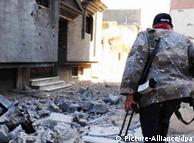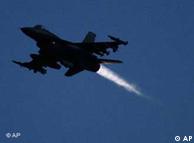NATO mulls range of bad options in Libya
For the past month, the international community has been trying to protect Libyan civilians from troops loyal to dictator Moammar Gadhafi - but only from the air, since the resolution agreed by the United Nations Security Council expressly forbids NATO troops on Libyan soil.
But what is the aim of this mission? Will the protection of civilians only end when Gadhafi has fallen?
Otfried Nassauer, founding director of the Berlin Information-center for Transatlantic Security (BITS), says these questions are yet to be answered. "This is a mission whose aim is not yet clear," he told Deutsche Welle. "If there is no quick military success, it could turn into a long and ugly foreign intervention, like in Afghanistan, or a conflict which you don't know how to end, like Kosovo."
A quick military success is certainly not in sight. And Nassauer says that NATO has relatively few ways out of Libya, especially because France, Britain and the US have ruled out direct negotiations with the Libyan regime. "In other words, it's not just a military stand-off, but a political one, which both sides can only get out of with difficulty," he said.
No feasible way out
For NATO, that means more airstrikes, even if weeks and months go by. The idea is to destroy Gadhafi's heavy weapons, his ammunitions stores and his communications structure, but that's extremely difficult, as the current siege of the port town of Misrata has shown.
There, the rebels are desperately calling for western ground troops, and the regime's soldiers and mercenaries have already infiltrated the civilian population and are fighting the rebels from within the city. NATO, meanwhile, is calling on civilians to leave the areas of fighting, so their airstrikes can proceed.
Still, Michael Brzoska of Hamburg University's Institute for Peace Research and Security Policy, says intensifying the military intervention would be a grave mistake for NATO. "I don't see a good exit at the moment," he told Deutsche Welle. "I'm assuming that in the end the country will be divided, perhaps in western and eastern halves, maybe with some enclaves on the Tunisian border. Then NATO will have to guarantee that there will be no major outbreaks of violence between the two sides."
 Rebels in Misrata are locked in a desperate siege
Rebels in Misrata are locked in a desperate siegeThe risks of staying the course
Brzoska was always opposed to a swift military intervention, and would have preferred a more intensive cooperation with Arab countries. But he says NATO has no choice but to stay the course, for now.
"I don't think Gadhafi can expect NATO to withdraw so he can achieve a military victory. NATO can't afford to lose face like that," he said. "On the other hand, I don't think NATO has any interest in getting involved in a war and destroying Gadhafi's troops."
"Of all the bad options, perhaps the most defensible is a long-term low-level NATO intervention," he added.
But Nassauer warned that staying for the long haul entails its own risks. "You can continue bombing for a long time," he said. "NATO is being damaged because the international community's conflicts over the mission are being carried on within it. It is losing its aura of being the strongest military alliance in the world. But other reputations are being damaged too - for instance the United Nations, who have committed themselves to this concept of taking responsibility for the protection of civilians, but have been unable to realize it."
The Security Council's Libya resolution expressly confines itself to protecting the civilian population. This new moral principle, which emerged following the genocide in Rwanda and the Balkans, dictates that the international community is responsible for civilians if the state fails to keep them safe. Brzoska describes the dilemma that this leads to, and which has to be faced every time on a case-by-case basis.
"That protection has to be there," he says. "It's very important for a lot of people round the world that they are not at the mercy of their governments. But that doesn't mean that we in the West should be like moral arbiters, deciding the future of a country by keeping long-term military operations going."
It's exactly that - a long-term military operation - that NATO is now committed to in Libya. Whether the members want it or not, NATO is a combatant there, not an arbiter.
Author: Sandra Petersmann / bk
Editor: Rob Mudge
Editor: Rob Mudge



No comments:
Post a Comment